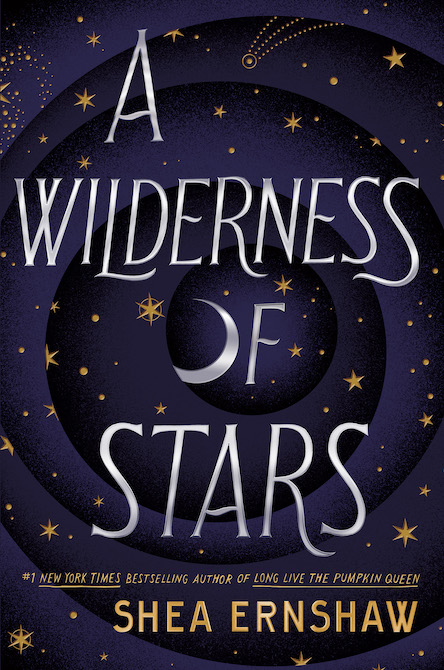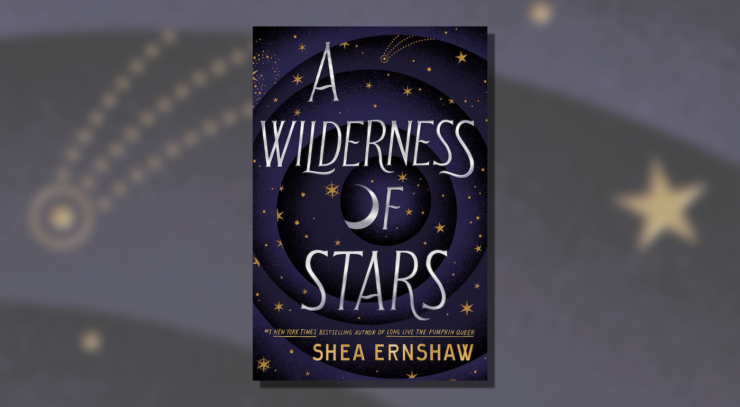When all is lost, look to the stars.
We’re thrilled to share an excerpt from A Wilderness of Stars by Shea Ernshaw, out from Simon & Schuster Books for Young Readers on November 29.
Vega has lived in the valley her whole life—forbidden by her mother to leave the safety of its borders because of the unknown threats waiting for her in the wilds beyond. But when Vega sees an omen in the sky—one she cannot ignore—she is forced to leave the protective boundaries of the valley. Yet the outside world is much more terrifying than Vega could have ever imagined. People are gravely sick—they lose their eyesight and their hearing, just before they lose their lives.
But Vega has a secret: she is the Last Astronomer—a title carried from generation to generation—and she is the only one who understands the knowledge of the stars. Knowledge that could hold the key to a cure. So when locals spot the tattoo on Vega’s neck in the shape of a constellation—the mark of an astronomer—chaos erupts. Fearing for her life, Vega is rescued by a girl named Cricket who leads her to Noah, a boy marked by his own mysterious tattoos.
On the run from the men hunting her, Vega sets out across the plains with Cricket and Noah, in search of a fabled cure kept secret by the astronomers. But as the line between friends and protectors begins to blur, Vega must decide whether to safeguard the sacred knowledge of the astronomers…or if she will risk everything to try to save them all.
After a dinner of dried apples and wheat cakes slightly burnt at the edges, and the last of the goat cheese, I climb the stairs of the farmhouse and find myself in the bedroom with the white hand-stitched quilt and lace-trimmed pillows. Whoever once slept in this room collected pinecones along the windowsill and hung a piece of cloth above the bed with tiny flowers printed into the fabric—now faded to pale, watery colors by the sun.
Buy the Book


A Wilderness of Stars
Pa appears in the doorway, his left hand clutching his pipe while his right reaches into his coat pocket for the pouch of tobacco. “If anything happens,” he says, eyes clicking to the window, “run past the orchard into the woods, and keep going. If those men come back, you need to get away from here. Don’t wait for me.”
I touch the window frame lined with dust. The clouds have moved away to the south, revealing a wet, clear sky, and I imagine climbing down the roof, dropping to the porch, then sprinting out into the trees—the breath burning my lungs. Maybe I could make it into the dark unseen. Or maybe those men would catch me and drag me back to the farmhouse.
“If they had seen your mark, if they knew who you were—” Pa shakes his head, eyes lifting to me, and I wonder if he’s been thinking about this since we left the miners’ cabin. Maybe this is why he took the rifle from me when I was so close to pulling the trigger. It wasn’t just about avoiding a gunfight; he was worried what would happen if they saw the tattoo on my neck. He didn’t care about Odie, about his supply in the cabin—he only cared about me, making sure they didn’t discover who I am. “They would have taken you, Vega. And I’m not sure I’d be able to find you.”
His words make me feel instantly cold, an echo across my flesh. My name, my past, the marks on my skin… put me in danger. Put everyone near me in danger.
But I wonder if maybe death isn’t the worst thing out here. It’s being taken. Hauled away like Odie and never seen again.
“Okay.” I nod at him, but I also know: If those men come riding up the road in the night, guns drawn from their hips, I won’t leave Pa behind. I’ll stay and fight. It’s a feeling inside me I can’t explain. A stubbornness maybe—the same part of me that refused to lower the rifle, to accept that they would take Odie and there was nothing we could do.
Because there is a cold desperation in the eyes of every person I’ve met since leaving the valley, a wild kind of fear hardened into their bones, a thirst that is deeper than the need for water. But a need to survive.
A feeling I didn’t know existed, until now.
And if I want to survive in this world, I can’t always hide. Tucked away in the valley. Sometimes… I will need to fight.
Pa glances down the hall, listening, like he hears something. But it’s only the house settling, the last of the rain shedding from the roof. “Get some sleep,” he says at last. “We’ll leave just after sunup. Fort Bell is still a day-and-a-half walk from here, and we don’t want to miss the market, sell what tonic we have left.”
I nod. Another day and a half lost. Another day and a half ticking closer to the end. He slips away down the hall, and I hear the thwap of the front door as he walks out onto the porch.
I slide open the bedroom window and let in the night breeze, listening to Pa puff on his pipe from the front porch. I doubt he’ll sleep tonight; instead he’ll watch the road, listening for any distant sounds of horses coming up the drive. But right now, only the evening birds chitter from the trees, and the wind sings down the halls of the old house. I like it here, with its sweet-smelling orchard and tall, protective trees and hidden driveway.
But we can’t stay.
I watch the horizon, the swirling, spinning universe coming awake above me, feeling a calm in my chest, the night sky familiar to me in a way that no place down here could ever feel.
My thoughts pinwheel back, sifting through all the stories Mom told me about the stars, about a woman who, just like us, looked up at the night sky and wondered. She was the first to chart the sky, to measure and make notes of what she saw. And her stories are mine now. Carried in my veins, in the ink tattooed on my skin.
I sink onto the soft, quilted bed, too exhausted to pull the blankets over me, and let my eyes sink closed. It seems strange to sleep in a room without star maps or constellations sketched onto paper hung from the walls. But still, I drift into dreams of stars spinning, spinning in that endless dark, galaxies erupting, planets taking shape—green and bottomless blue. I dream of the orchard. Of apples like round moons. But then the men appear, burns on their arms that still smolder and spark, striding up through the orchard, hissing my name. “Vega… Vega…” Their voices as thin as air, while the man with the slit across his throat reaches out for me, hand cold and wet, rain falling from the red, dying sky. He pulls one of the pistols from his hip and points it to my skull, metal pressing against my soft skin. “Tell me who you really are?” he hisses in my ear, but before I can answer, he pulls the trigger.
I wake, hands grasping for the ceiling, trying to push him back, push the dream away, and almost let out a scream. I sink back onto the bed, gulping down the cold morning air, then force myself to stand, to stagger to the window. Needing to see, to be sure.
But there are no men on the road. No horses. Everything is quiet.
I slide down to the floor, hands pressed to my eyes, then open them again, staring up at the sky.
The sun isn’t yet above the horizon, but just above the tree line, the silvery night sky has a sheen to it, a flickering quality—like moisture caught in the air, refusing to turn to rain.
The anomaly.
At night, it is a dark blot in the sky taking up half the horizon, but at dawn and dusk, when the light strikes at just the right angle, it turns shimmery and gleaming—as if it were reaching long tendrils of light down to us, licking at the lower atmosphere over our heads. Mom often stayed up late to chart and measure it, searching for any glimmer of hope.
It’s beautiful. But it also sends sharp needles of fear down my spine.
I stare at it a moment longer, blinking, watching, but then it dissipates like dew, and I close the window.
With the sun burning bright against the soft blue sky, the anomaly is gone from view.
But I know it’s still there. Always there.
Getting closer.
Excerpted from A Wilderness of Stars by Shea Ernshaw © November 2022 used with permission of Simon & Schuster Children’s Publishing.










